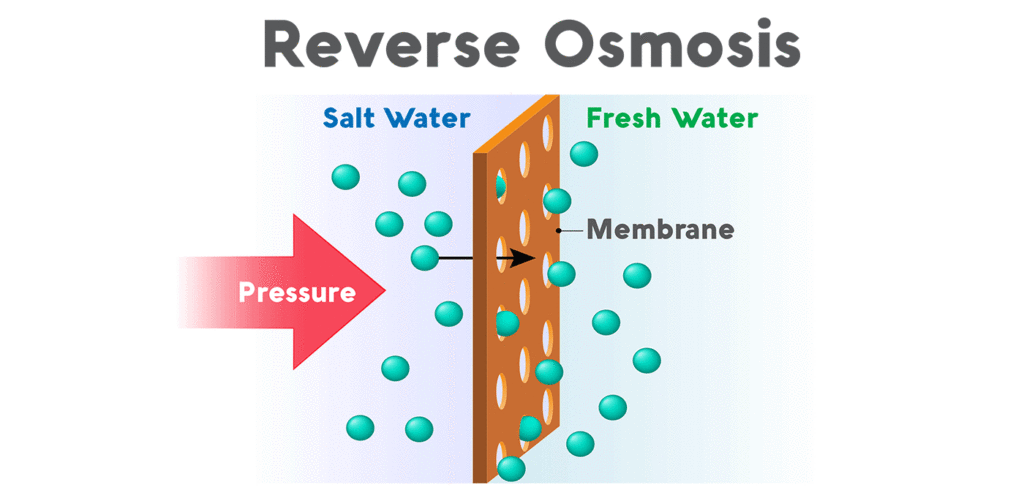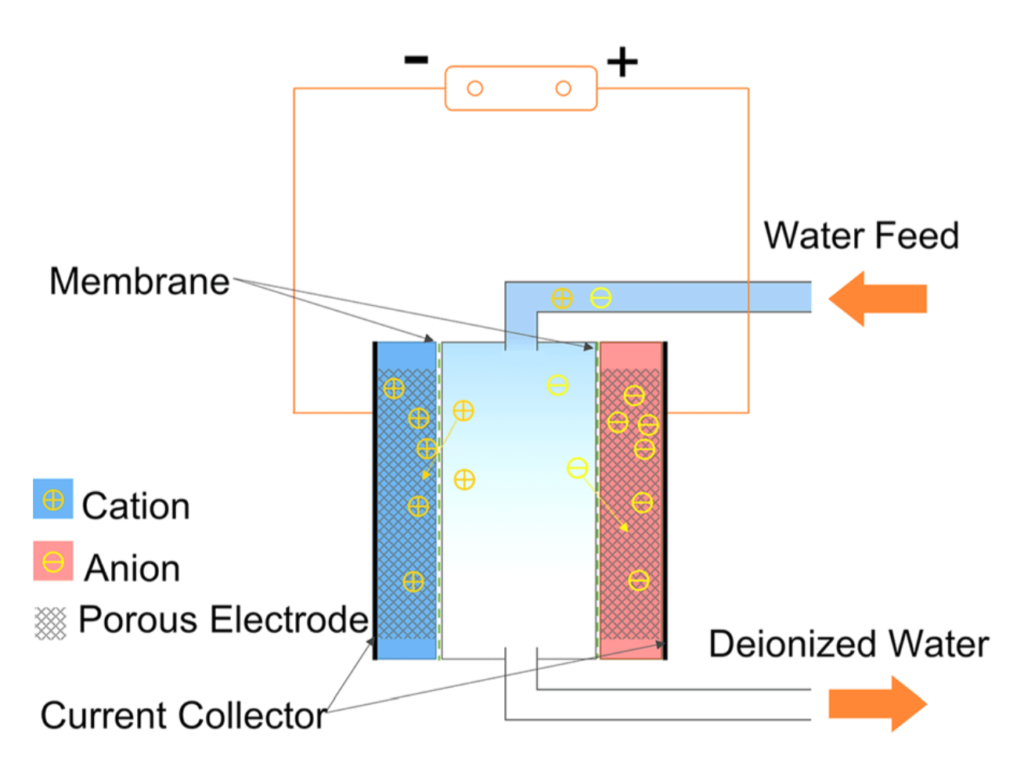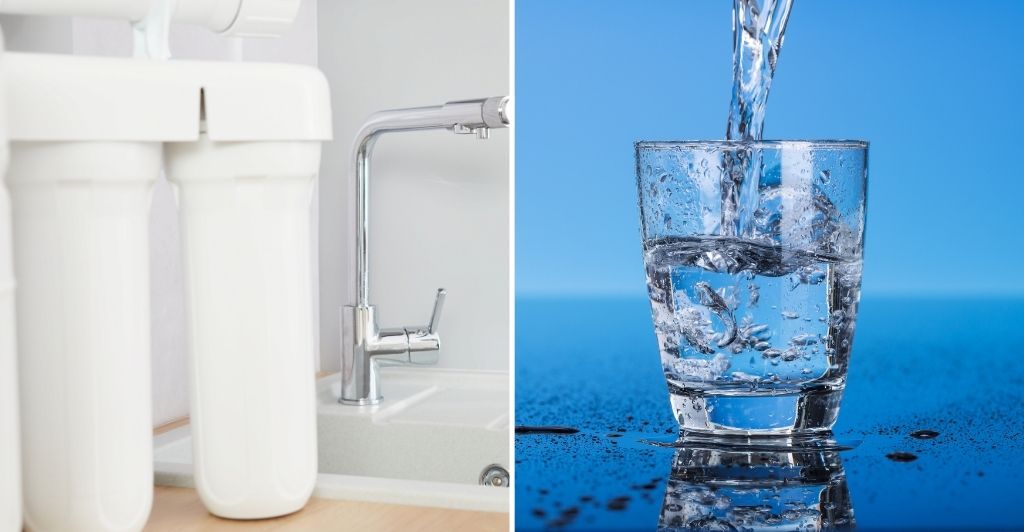Various water filtration systems are available in the market. Deionization and reverse osmosis remove harmful particles as they remove particles and chemicals such as calcium & magnesium, arsenic, iron, salt, silt & sand, and copper from water.
A major difference between these filtration systems is that deionization uses ion exchange resins to get rid of the contaminants. In contrast, reverse osmosis uses a semipermeable membrane to perform the task.
However, only RO filters can get rid of bacteria, viruses, and protozoa found in water. Deionization has the upper hand over RO filtration in terms of the fact that it can also act as a water softener.
So in this post, we will discuss Reverse Osmosis Vs Deionized Water filtration systems to find out the best method for you…
Reverse Osmosis Vs Deionized Water
A reverse osmosis filter uses the mechanism of pressure to reverse water’s flow to make it pass through a membrane and a filter that removes all the minerals, chemicals, and bacteria from water.
If your water has herbicides and pesticides, you should install a reverse osmosis filtration system to remove them from your drinking water.

RO water is also good for the environment as it makes people stop buying bottled water, further ensuring that plastic waste doesn’t get left behind.
The process of reverse osmosis involves various stages. At the initial stage, a pre-filter is used to remove sediments such as rust and dirt particles.
Then, the water is forced to pass through a semipermeable membrane that stops all the contaminants from passing through it to ensure only clean water comes out.
The membrane performs this activity with the help of its pores which are so small that they filter the contaminants, but they are large enough for allowing water to pass through them.

At the last stage, the water flows through a post-filter, which is a carbon filter that eliminates VOCs and ensures that your water doesn’t taste and smell bad.
After getting filtered, the water is stored in a tank until needed. The RO filter stops the process automatically and restarts when the storage tank needs a quick refill.
What is Deionization & How Does it Work?
Deionization aims to eliminate minerals and salt contaminants found in water. This process eliminates cations, including sodium ions, calcium, iron, and copper, and it also removes anions like chloride and bromide from water.

These filtration systems use ion exchange resins to remove harmful components as the resins bind with all the mineral salts present in water. This separates the water from these mineral salts and leaves clean water for use.
Deionized water is required for:
- Plating
- Car washes
- Power plants
- Cosmetics
- Food processing
- Pharmaceuticals
- Processes held in medical labs
- Manufacturing of electronic items
Deionization is a filtration process that can purify water of 3 grades:
- Demineralized water
- High-purity water
- Lab-grade/medical-grade water.
While demineralized water can be used to wash cars, medical labs require water that is free from all kinds of contaminants.
Benefits of Deionization & Reverse Osmosis
Taking the elimination of mineral contaminants into consideration, RO filtration and Deionization are equally effective. However, reverse osmosis has the ability to remove viruses and bacteria, while deionization cannot do so.

Deionization, on the other hand, can also turn hard water into soft water, while reverse osmosis cannot do that.
Cons of Deionization & Reverse Osmosis
Magnesium and calcium are minerals that are essential for our body. However, both reverse osmosis and deionization remove these essential minerals from water.
Moreover, reverse osmosis removes bacteria and viruses, but deionization doesn’t remove them, and hence, deionized water may not be suitable for drinking.
What do Reverse Osmosis & Deionization Eliminate
A common factor between both of these filtration systems is that they are excellent at getting rid of harmful substances from water. Both of these filtration systems successfully remove the following components found in water:
- Iron
- Copper
- Sand
- Arsenic
- Salt
- Dirt
- Calcium
- Magnesium
Main Difference Between Reverse Osmosis Vs Deionized Water Filtration Systems
Apart from the basic difference that both of these filtration systems use different modes to filter water, another difference between reverse osmosis and deionization is that RO filters water to make it appropriate for cooking and drinking purposes.

On the other hand, deionized water is free from contagious ions and minerals, but you may not be able to consume it may have a bad taste.
The level of purity differs in both of these filtration systems as RO water is good for consumption, but it contains oxygen and salts, while deionized water eliminates oxygen and salts but it contains dissolved solids present in tap water.
Conclusion
The type of water filtration system you choose should depend upon the purposes for which you’ll be using the water. Filtering water using RO filters or deionization has its own pros and cons, and you should pick the one that suits your needs.
We hope this guide helps you make the right decision as you thoroughly understand both of these processes, along with what they eliminate from water and how they’re different from each other.
If we had to make a choice, we would choose a reverse osmosis filtration system over deionization as it removes almost all the contaminants found in water. It doesn’t require high maintenance as opposed to deionization filters that need to be replaced regularly.
FAQs
Is Reverse Osmosis the same as Deionization?
No. Reverse Osmosis filtration uses a semipermeable membrane to get rid of contaminants, while deionization makes use of ion exchange resins to free water of these harmful particles.
Is consumption of RO water harmful for kidneys?
The pH value of the water drops after getting filtered by the Reverse Osmosis filtration system. Consumption of RO water can have health effects on your body in the long run, including gastrointestinal problems and kidney disorders.
